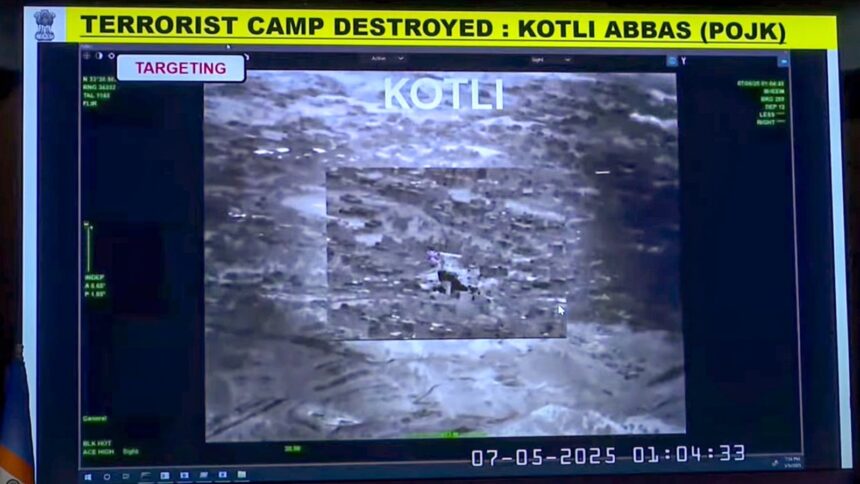Ten hours after India launched strikes on nine sites hitting the terrorist infrastructure in Pakistan and Pakistan-occupied Kashmir (PoK), Indian officials said that Operation Sindoor, which took place between 1.05 am and 1.30 am on Wednesday, targetted the headquarters of Lashkar-e-Taiba and Jaish-e-Muhammad.
Colonel Sophiya Qureshi said that Operation Sindoor “was launched by Indian armed forces to deliver justice to the victims of the Pahalgam terror attack and their families. Nine terrorist camps were targeted and successfully destroyed.”
Explaining about the operation, Wing Commander Vyomika Singh, during a briefing with Foreign Secretary Vikram Misri and Col Qureshi, said that the action on the terror camps were undertaken through “precision capability” and with the use of “niche technology weapons” with “careful selection of warheads” to ensure that there were “no collateral damage”.
“The point of impact in each of the target was a specific building or a group of buildings and all the targets were neutralized with clinical efficiency,” Wing Commander Singh said.
Underlining that “no military establishments were targeted,” she added that “India has demonstrated considerable restraint in its response”. “However, it must be said that the Indian armed forces are fully prepared to respond to Pakistani misadventures, if any, that will escalate the situation.”
Col Qureshi and Wing Commander Singh gave a detailed presentation with footage of strikes and maps of the terror camps in Pakistan and Pakistan-occupied Kashmir.
Col Qureshi said that the targets for “was based on credible intelligence inputs and the role of these facilities in perpetrating the terror activities”. “The locations were so selected to avoid damage to civilian infrastructures and loss of any civilian lives. This was done with due diligence,” she added.
Detailing about the intention behind the strikes, Col Qureshi said: “Over the last three decades, Pakistan has systematically built terror infrastructure. It is a complex web of recruitment and indoctrination centres, training areas for initial and refresher courses and launch pads for handlers. These camps are located both in Pakistan as well as Pakistan occupied and Kashmir areas.”
Framing the basis of the attacks, Foreign Secretary Vikram Misri said, “Investigations into the Pahalgam terror attack have brought out the communication notes of terrorists in and to Pakistan. The claims made by the Resistance Front and their reposting by known social media handles of the Lashkar-e-Taiba speak for themselves. Identification of the attackers based on eyewitness accounts, as well as other information available to law enforcement agencies, has also progressed. Our intelligence has developed an accurate picture of the planners and backers of this team.”
He added that the features of this attack also tie in with Pakistan’s long track record of perpetrating cross-border terror in India. “Pakistan also has a well-deserved reputation as a haven for terrorists from around the world, with internationally proscribed terrorists enjoying impunity there,” he said.
He further stated: “On April 22, 2025, Pakistani and Pakistan-trained terrorists belonging to the Lashkar-e-Taiba carried out a savage attack on Indian tourists at Pahalgam in Jammu and Kashmir in India. They murdered 26 people, including one national of Nepal, causing the largest number of civilian casualties in a terrorist attack in India since the attacks of November 26, 2008. The attack in Pahalgam was marked by extreme barbarity, with the victims mostly killed with headshots from close range and in front of their families. Family members were deliberately traumatized through the manner of the killing, accompanied by the exhortation that they should take back the message.”
He added that despite a fortnight having passed since the attacks, there has been no demonstrable step from Pakistan to take action against the terrorist infrastructure on its territory or on territory under its control. “Instead, all it has indulged in are denials and allegations. Our intelligence monitoring of Pakistan-based terrorist modules indicated that further attacks against India were impending. There was thus a compulsion both to deter and to pre-empt”, he said.
“Earlier this morning as you would be aware India exercised its right to respond and pre-empt as well as deter more such cross-border attacks. These actions were measured, non-escalatory, proportionate, and responsible. They focused on dismantling the terrorist infrastructure and disabling terrorists likely to be sent across to India,” he told reporters.
Recalling the UN Security Council’s April 25 statement on the Pahalgam terror attack, underlining, “the need to hold perpetrators, organisers, financiers and sponsors of this reprehensible act of terrorism accountable and bring them to justice”, he said, “India’s latest actions should be seen in this context.”








